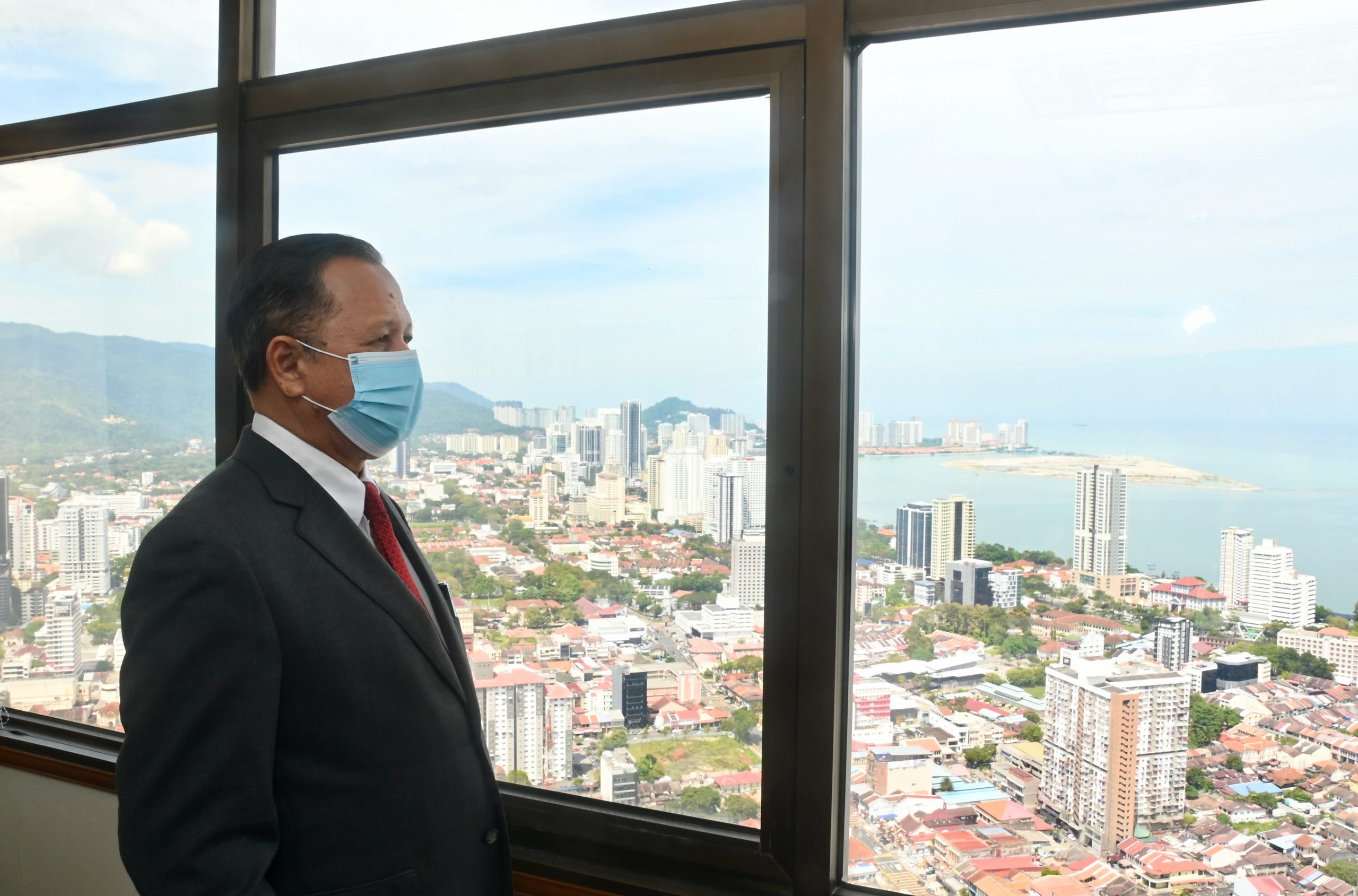PENANG needs a new blueprint for further economic growth, says state Entrepreneurial Development, Trade and Industry Committee chairman Datuk Abdul Halim Hussain.
He said it is important for Penang that after being transformed by 50 years of industrialisation since the 1970s, to look at its position from 2030 to 2050.
He said although Shenzhen, which started to develop its E&E (electrical and electronics) sector much later than Penang in 1991, the Chinese city has now become the technology hub of the world.
“Penang used to focus on E&E industry. But now, we have branched out to medical devices, aerospace, defence, rail (transport) and Internet of Things. So, we do not rely on semi-conductor industry only,” Abdul Halim told Buletin Mutiara in an interview at his office in Komtar.
“This has to be further developed. Industry players need to focus on original design manufacturing (ODM) that requires research and development (R&D) to sustain talent development so that Penang can be empowered to compete internationally.
“We’ve the talents here. It’s time to establish an R&D centre to create more jobs, or we’ll have tough times and lose all the talents.
“After 50 years of industrial revolution, we are too dependent on multinational companies (MNCs) which focus on manufacturing contract or original equipment manufacturing (OEM).”
He added that Penang has approached the Northern Corridor Economic Region (NCER) for assistance to set up the R&D centre which would cost between RM50 million and RM100 million.
Abdul Halim said the R&D centre, for instance, could inspire local talents to produce designs and leverage on countries, with cheaper labour, to manufacture the products.
He acknowledges that competition is getting stiffer for Malaysia as the likes of Tesla, Hyundai, Toyota and Amazon are going to invest in Indonesia, while Vietnam and Thailand are a drawcard for E&E companies.

Penang, Abdul Halim said, was fortunate that it registered a record high of RM16.9 billion in total approved manufacturing investments in 2019, out of which FDI accounted for RM15 billion.
While the investment report for the whole of 2020 is expected to be released by Malaysian Investment Development Authority (Mida) in March, Penang has achieved RM10.6 billion in total approved manufacturing investments for the first nine months (January to September 2020), with 83 percent of the amount coming from FDI.
“If we can secure half of what we got last year, say RM5 billion to RM6 billion in FDI this year, the state would be happy. It is going to be tough,” said Abdul Halim.
“We need FDI. At the same time, we also need to build up our own strength for our local large companies.
“We have a few multinationals run 100 percent by locals, which means the talents are here and we need to multiply them.”
He said tech companies are generally doing well even during the second movement control order (MCO 2.0) but he admitted that others in the manufacturing, hospitality and services (wholesale and retail) are affected by the lockdown.
So far, he said four factories in Penang had shut down since last year not because of the Covid-19 pandemic but their closure was due to a change of business strategies.
“Manufacturers also need to adapt to IR 4.0 and go for automation and robotics.
“The Covid-19 pandemic has taught us to reduce our dependence on low-skilled foreign workers. They deprive our locals from higher pay. We need to train our locals, reskill and upskill them so that they can get higher income.”
He also encouraged local businesses to take advantage of grants and loans offered by the state government and Federal Government
For instance, he said under the Penang Business Continuity Zero-Interest Loan (also known Skim Peka PKS), loans up to RM50,000 were offered to small medium industries (SMIs) and loans up to RM20,000 were offered to micro businesses or small medium enterprises (SMEs).
Thus far, a total of 1,651 entrepreneurs have received these benefits, involving a total allocation of RM28.74 million.
To further help them, Abdul Halim said 1,060 merchants in 2019 and 300 merchants in 2020 had been trained under the state’s initiative to conduct their businesses online.
The state government also collaborated with Shopee by injecting RM500,000 for six months from June to December last year to help micro traders float their products in their e-commerce platform.
Abdul Halim said the joint venture, named as Penang E-Mall, proved successful as it resulted in a total sales value of RM6 million.
“The number of traders (merchants) using the platform increased from 5,051 in June to 15,111 in December 2020 – an increase of 10,000 or 300%.
“As for the halal sector, the number of traders increased from 36 traders in June to 717 in December 2020.
“This is very encouraging. For this year, we will work not only with Shopee but also with other platforms like Lazada.
“We will also work with all delivery partners, like DeliveryEat, foodpanda and GrabFood to stimulate the economy,” Abdul Halim said.
He said the state would disburse 350 laptops to B40 group next week to encourage the micro traders get involve in e-commerce. Each laptop costs RM917, thus the project would incur a total of RM320,950.
“This is in line with the state’s Penang2030 vision. We want to raise the income of the B40 so that they won’t be left behind in the digital era. They need the computers.”
Abdul Halim said the state government had also looked after the hawkers at pasar malam (night market), pasar tani (farmers’ market) and those with licence, distributing 1,000 tents to them since 2019.
Another ambitious programme that Abdul Halim said the state would embark on is to create a culture of entrepreneurship, especially among undergraduates.
“Graduates nowadays are not guaranteed of landing jobs. This means prior to graduation, they must want to become an entrepreneur. Hopefully, there is at least one member in a family who is involved in business.
“Our programme will start next month and provide training to a small group via Zoom or Google Meet.
“They have to start acquiring new knowledge and new business models,” Abdul Halim said.
Story by K.H. Ong
Pix by Alissala Thian

